My thinking and feelings about community are constantly changing, as they should. The market has changed. The world is changing. Our approaches need to change too.
Here are my top of mind thoughts right now.
1️⃣ I shrug at "what community is"
This doesn't mean it's not important, just not important for me in my context right now. A clearer definition doesn't help me a built a better community, exploring new thinking and boundaries do.
I feel a deep sense of dissatisfaction and incompleteness every time I think about community definitions. Community isn't changing, but it is changing. I'm trying to think and maintain an open mind to what makes good community.
Saying that, here some attempts at community definitions that are worth looking at.
2️⃣ Community is Care
Awkwardly, after expressing my distaste for definitions, one way I am edging towards explaining community is that it is 'care'. Community is care, I'm not sure you can have community without some form of care.
An audience can turn into a community if it is treated with care. Without the care, it won’t.
The three core focuses I came up with for community is care were:
- people: we have to care and give a damn for the people we aim to serve
- alignment: we have to care for what we are aligned with, often people refer this as their community or business ‘vision’
- ecosystem: we have to support and care for the ecosystem we are a part of
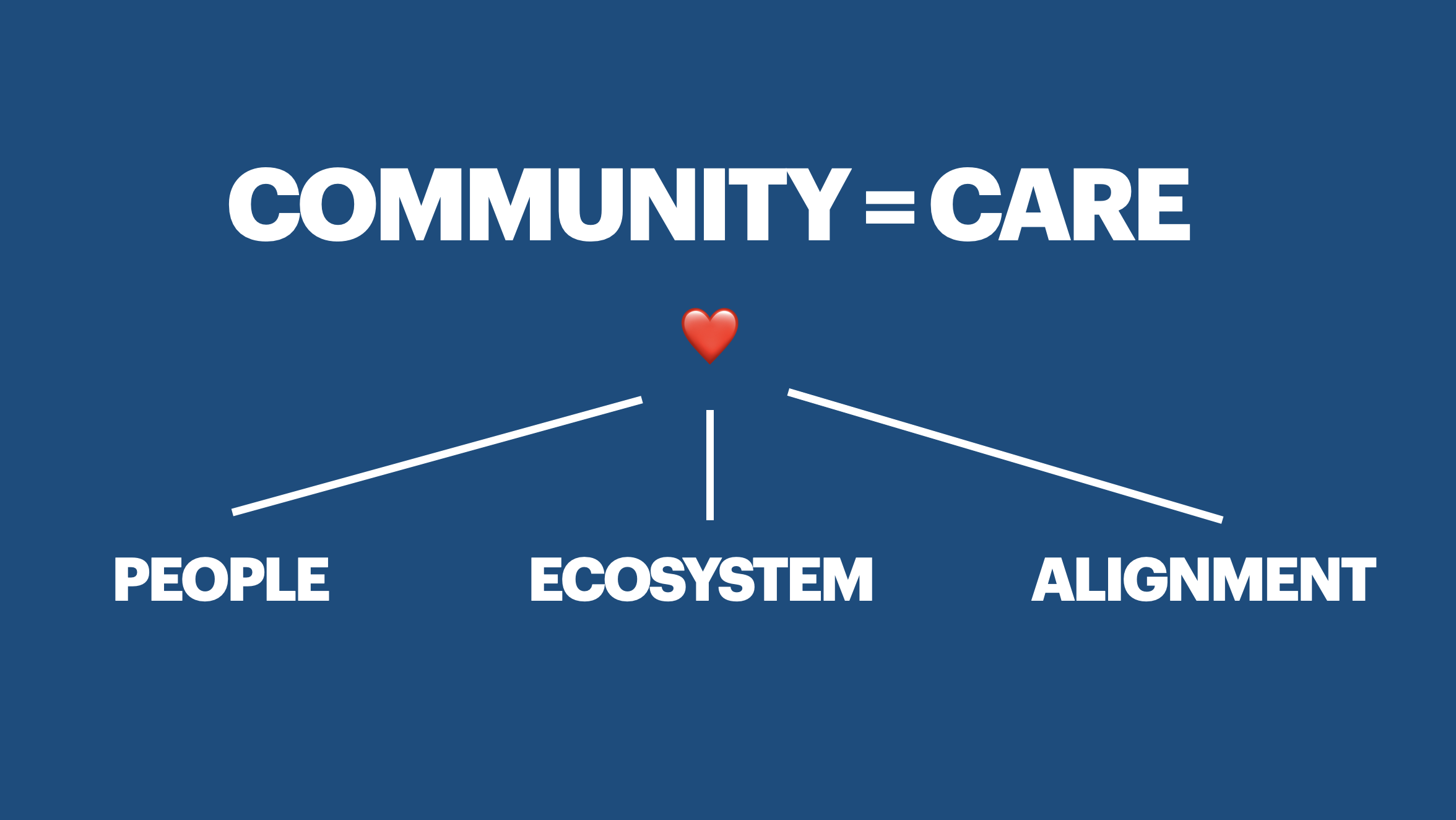
I'm still mulling over this one, I might change my mind later. 🙂
3️⃣ Community work is multidisciplinary
And the more we understand this, the wilder it feels that building community is left to one person or department to build. It's a big responsibility to take on. And good luck tracking it all, unless you're willing to measure the business as a whole.
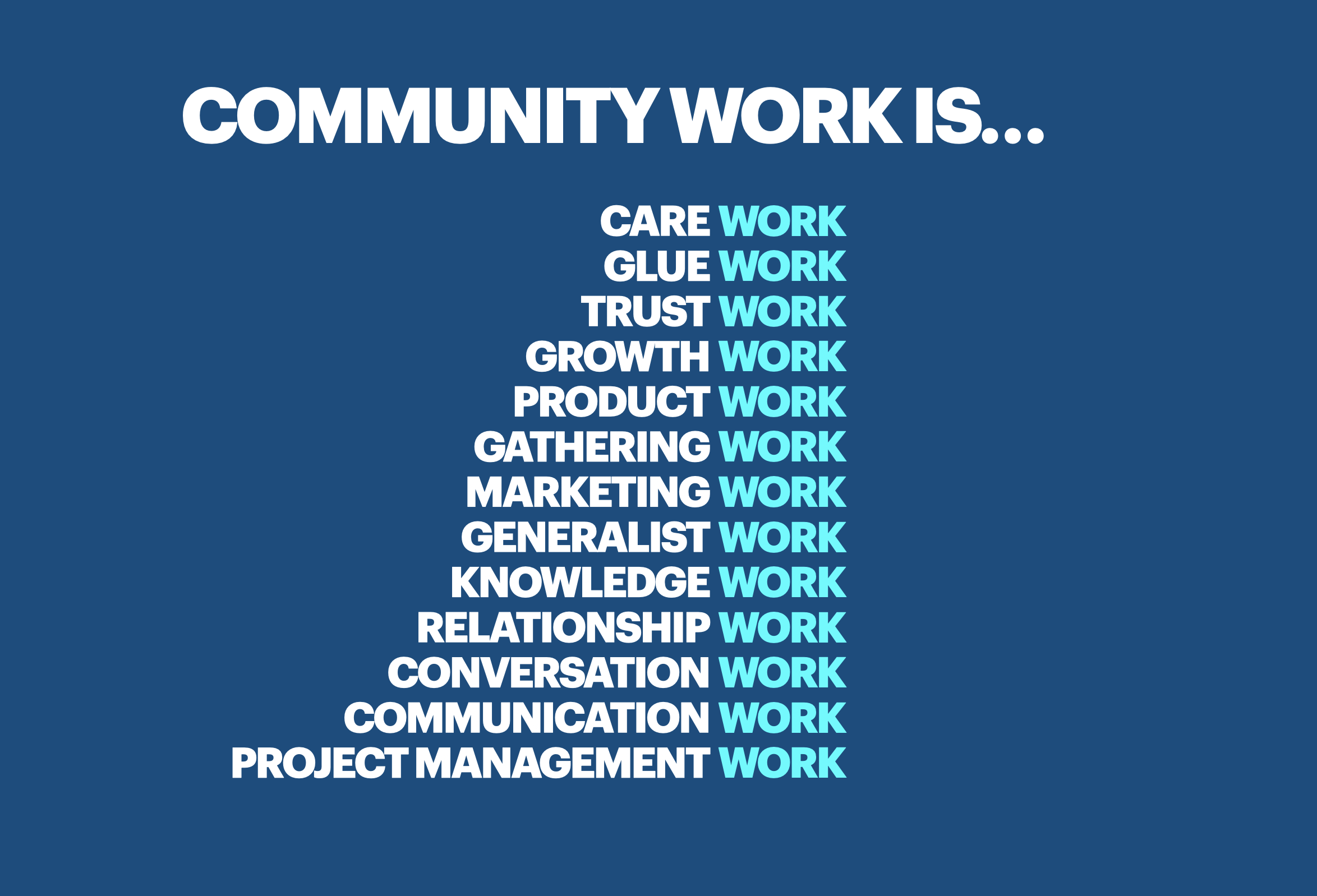
4️⃣ Community is less about the relationships and more about the care or action
I often get a bit of a dirty reaction when I say this. I feel people over invest in conversations and relationships when we're better off ensuring we practice care and help take action. In communities we should experience care, but that doesn't mean individuals have capacity to develop deeper connection.
It actually becomes overwhelming and builds unnecessary pressure on everyone. And of course I will always consider designing that into our efforts, but it's only part of the picture. And perhaps it's a much smaller part than we want to admit.
The reality is most relationships are loose ties and not strong bonds. As humans we simply don't have capacity to always be investing in relationships. If we design all our efforts on relationships those that aren't building them feel like they are doing something wrong.
We have to get better at showing that community is about more than building relationships. Members are more likely to feel like they are helpful or contributing if we build in other outcomes where they can feel positivity from their input.
5️⃣ Abstract communities should become part of our community vocabulary
I came across the abstract community term in article The Community Community where Nathan Beacom says:
A word that once referred to a group of people sharing life together in a particular place has come to refer, today, to abstract categories. Where once we might have spoken of the community of the South Bronx or the community of Parma, Ohio, we now talk about everything from the fishing community to the gaming community to the disability rights community, abstract groups that may not share life or know one another at all. This is not just a minor linguistic development; it means that the idea of community has been lifted out of the context of concrete relationships, and the consequences of this change are significant for our public life.
I'm personally in many abstract communities. For me they show up in health, fitness or creative Facebook groups. I care about, appreciate and find value in what is shared, but I have zero intention of building friendships. This is a great example of why communities are not always about relationships, but are more about care. People in many of these abstract groups don't want to build relationships, but the thing they have in common is caring about 'a thing'.
We can also see lack of focus on building relationships in other types of communities. There is a layer of abstraction for communities of product and practice too. People will come for something specific, like learning and knowledge, but it's really a smaller minority that end up building relationships.
This poll below is a good example. People come for the knowledge and learning, the relationships aren't usually a priority. But we can build in care and relationship building with how we learn. I'm not saying no to relationships, I'm saying lets actually be realistic and find balance with what we can achieve.
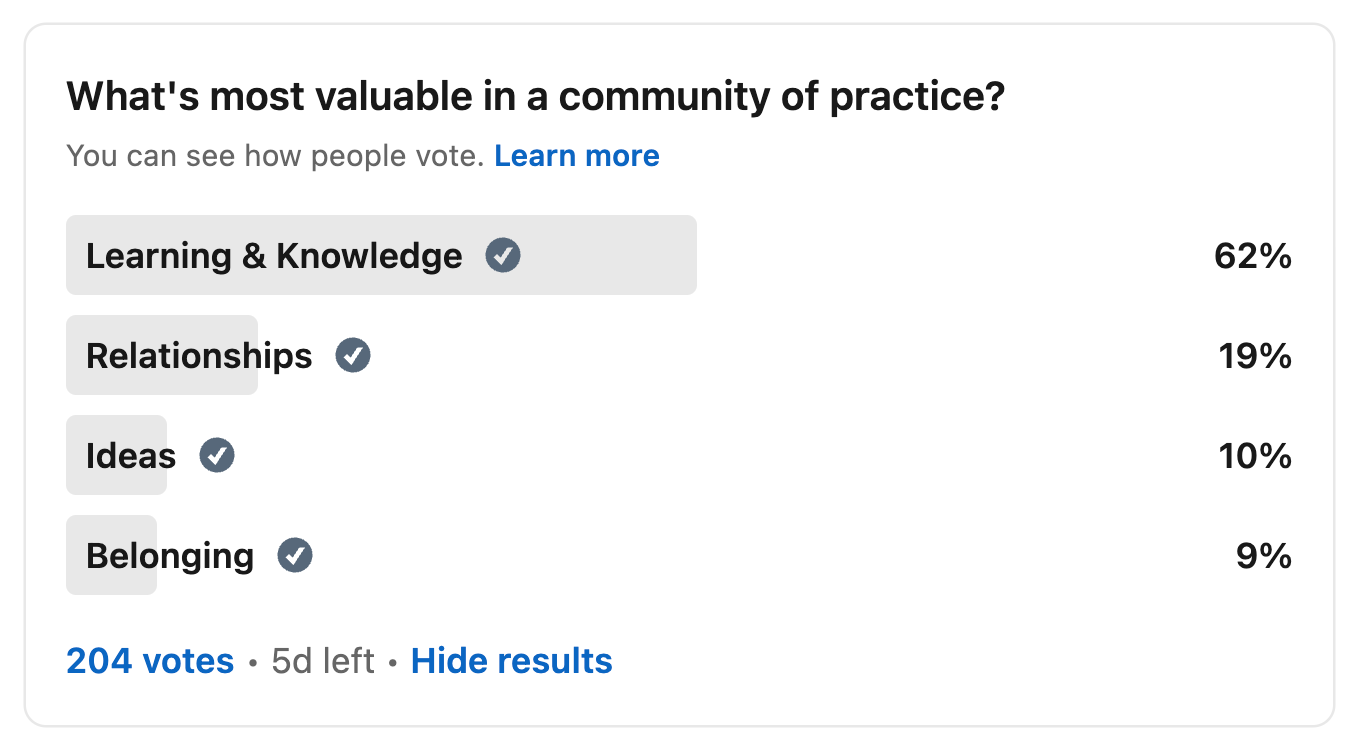
6️⃣ Care Members > Core Members
On the topic of community and care. We often talk about how important 'core' members are. And as a result of this, so many of our communities are reliant on a small amount of people.
I like the idea of shifting towards 'care members' as a philosophy. I think we've forgotten how to care, a bit more intentionality on caring will do communities no harm.
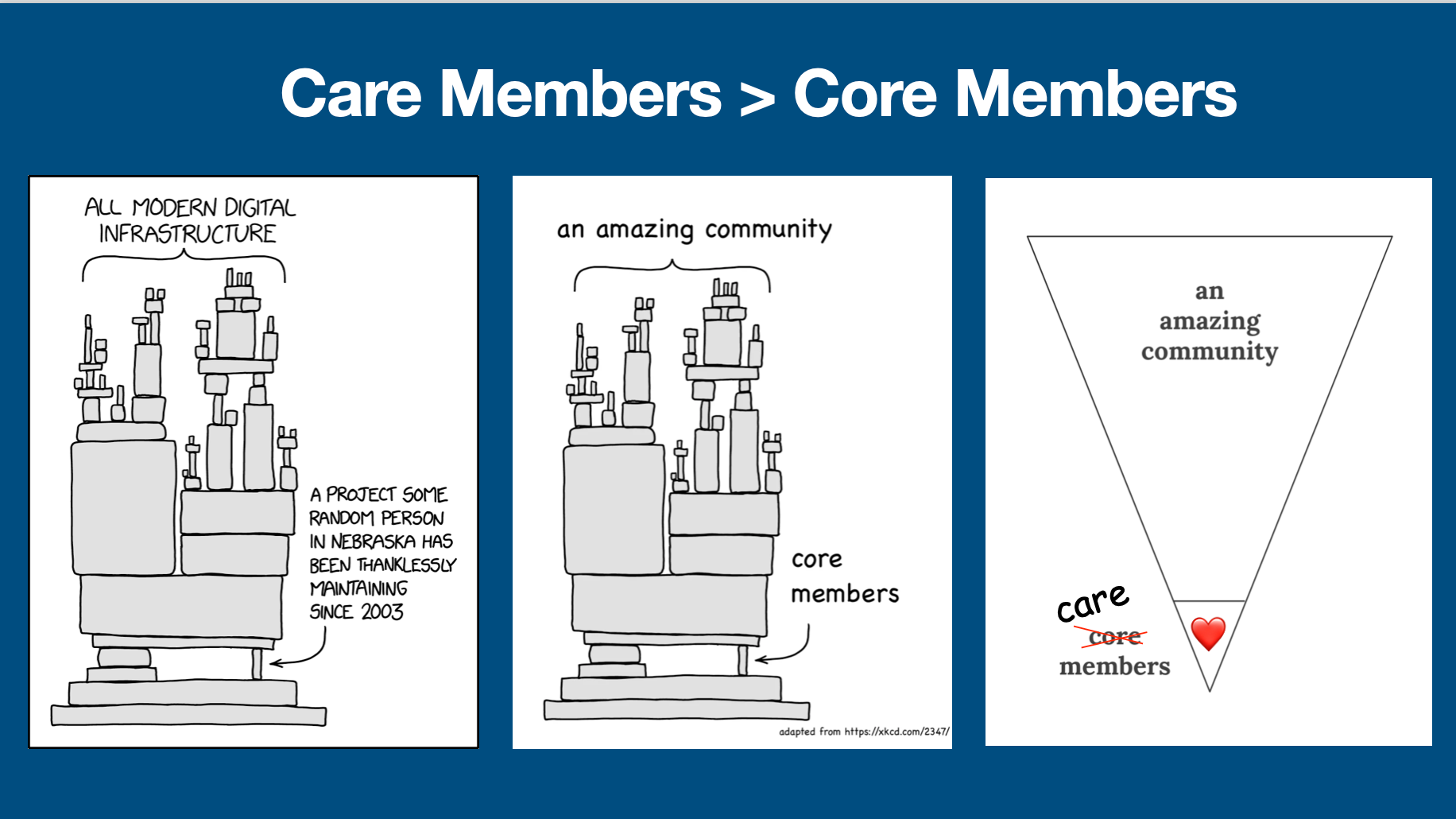
7️⃣ Is it community compatible?
Community compatibility is to service and do community work that aligns and respects the community’s needs.
Our community work can only have real impact if decisions in the rest of the business are community compatible. As community people we should be asking this question to other parts of the business as much as we dare. On the flip side of it, leaders in businesses need to understand how their decisions may help community flourish or die.
Really what this means is that community building is team work.
8️⃣ Without action, community conversations weigh us down
I created this concept a while back and I now think about it every day. I don't want to create any noise for the sake of it and I'm so tired of communities that do.
Maybe I'm just getting old and cranky and life feels increasingly fragile, but now when I approach conversations I ensure a majority of them have a purpose. I want to respect people's time and also surprise people that we are truly listening by taking action on what they say.
As a quick example, about 80% of discussions that we start and facilitate at Ministry of Testing are tied into bigger projects for our courses, content, events and research activities. Conversations we host lead to us inviting, quoting and building upon people's contributions.
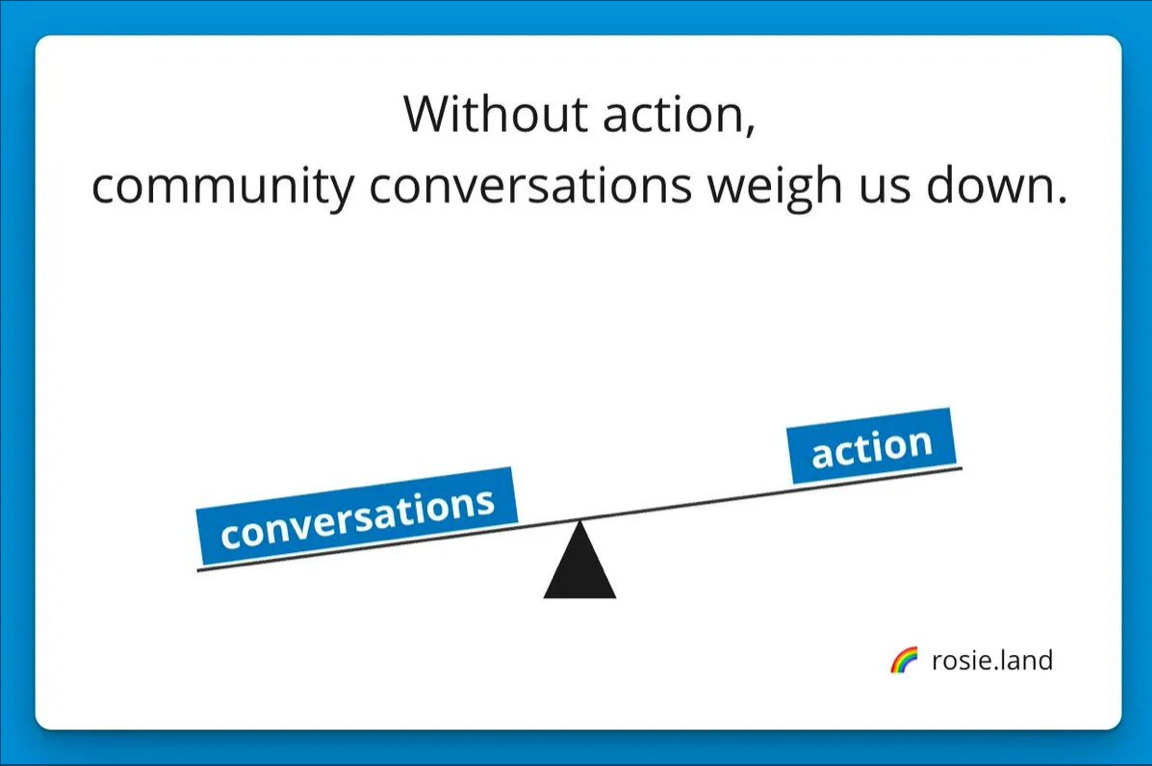
9️⃣ The 80/20 conversations rule
To help us stop talking so much, build a philosophy of only having 20% of your efforts going into conversations.
Use the other 80% to create other value.
It then won't be an difficult conversation when you get pulled up for 'lack of engagement' because you can then point to the other 80% of things you are working on.
The other things in the 80% should be things that are action driven and bring value. Community research. Directories. Job boards. Education. Content. Product support. Marketing support. Save time. Innovation and ideas contributions.
Ultimately, the focus is to help your business solve problems.
🔟 Community research is care work
I've been going deeper into the idea of research being community care work. The way to show you care for a community is to do deep research. To know all the moving parts, and as a result you are prime to help people.
Research work then becomes your competitive advantage. Research to many is boring, tedious and takes forever. To do research well means you care for the community you serve.
Research can feel slow and lack traction. I'd encourage you to keep going, we need more communities that go deep, so much feels superficial these days. To go fast, perhaps there are times you need to go slow.
1️⃣1️⃣ Community Flywheels are the best
Adopting the mindset of community flywheels has been one of the best models that I keep tapping into and re-iterating to the team in my day to day work.
Everything we do. Every community activity. Every project. Every idea. Is looked at from the perspective of community flywheels:
- How does this fit into what already exists?
- How can we improve or tweak it?
- Is there a reason we are doing this?
- Are we being effective?
- What impact does this bring?
- Why is this meaningful?
- What happens if we add or remove this?
The more your team understands how flywheels work, the more they can adopt the mindset to create a community flow-wheel!
1️⃣2️⃣ Community reaches places we never imagine!
The community world shifts between advocating between having dedicated community teams, or not. I'm all for community teams, but I'm also for not having a community team.
I'm currently toying around with the idea of not having a community team. This doesn't make our community less, it makes our work more focused. And perhaps one day we'll go back to a 'community team'. The reality is what matters is that 'community' is happening. It's cool to explore different ways to make it happen.

Part of me loves the idea of community being at the heart of everything we do. With practice and intention, community reaches everywhere, should we choose to have it centered in everything we do.
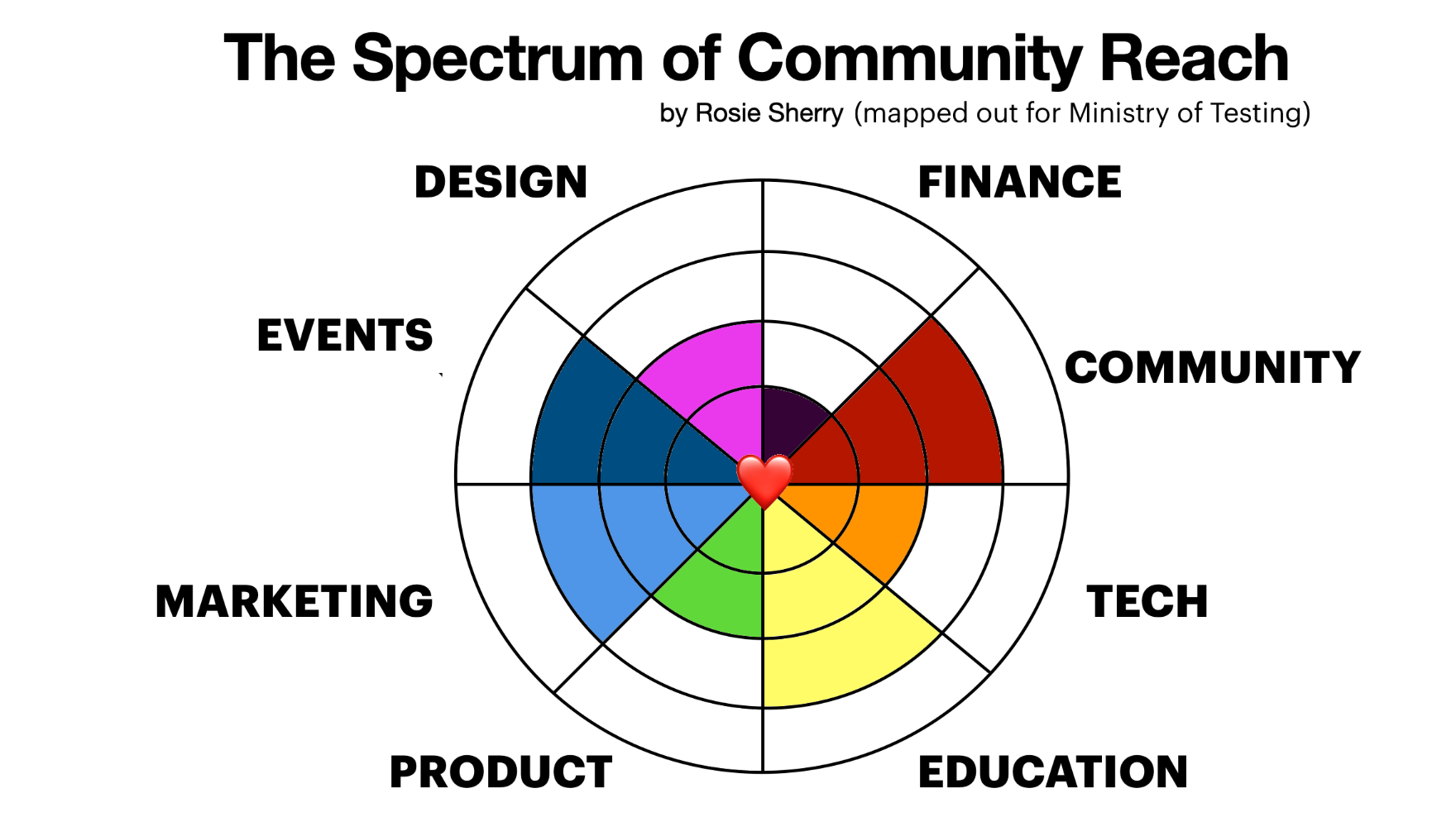
There you have it! 12 thoughts to get your community juices flowing. This is where my brain is at with community. It is forever evolving.
Where's your thinking at with community right now?
🐌


